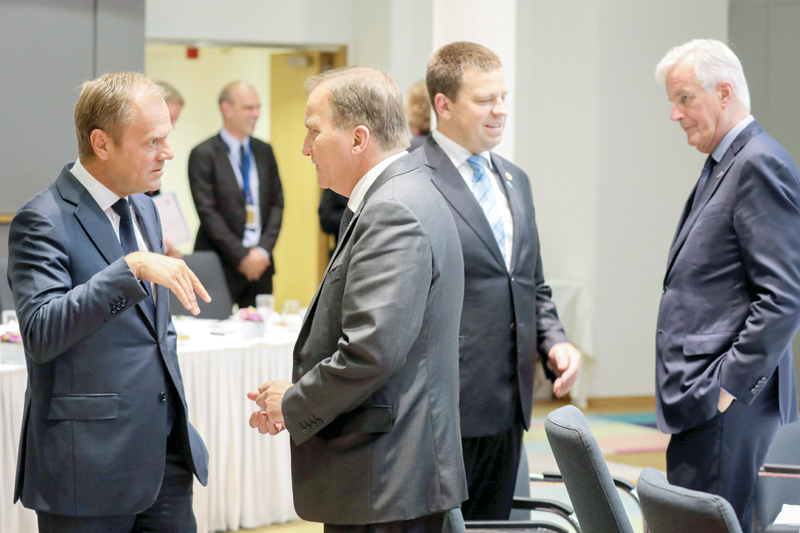

Brussels: EU leaders defended a hard-won migration deal agreed after marathon talks on Friday that Italy hailed as a breakthrough despite emerging doubts on whether bloc partners would shoulder more responsibility for migrants.
Italian Prime Minister Giuseppe Conte, who heads a month-old anti-immigration government, had vetoed joint conclusions for the entire agenda of the summit in Brussels until his demands were finally met before dawn.
Italy has turned away a series of migrant boats in recent weeks, sparking a fresh political row three years after the bloc faced its biggest ever migration crisis.
“Today Italy is no longer alone. We are satisfied,” Conte, a former law professor who until recently was a virtual political unknown, told reporters following nine hours of talks described as “virulent”.
The 28 leaders agreed to consider setting up “disembarkation platforms” outside the bloc, most likely in north Africa, in a bid to discourage migrants boarding EU-bound smuggler boats.
Member countries could also set up migrant processing centres — but only on a voluntary basis — to determine whether the arrivals returned home as economic migrants or were admitted as refugees in willing states.
But French President Emmanuel Macron said these new-style centres would be reserved for countries on key migrant routes such as Malta, Italy, Spain or Greece — and not France.
“France is not a country of first arrival. Some want to push us to that and I refused it,” he said as he arrived for a second day of leader talks in Brussels. Asked if Austria would open a centre, Prime Minister Sebastian Kurz said: “Of course not... we are not a first arrival country, unless people jump from parachutes.”
In their deal the leaders made an offer to German Chancellor Angela Merkel, who faces a rebellion from within her own coalition government, with moves to stop migrants registered in Italy and other EU countries from moving to Germany.
After allowing more than one million asylum-seekers into Germany since 2015, Merkel faces an end-of-month deadline from her own interior minister to curb so-called secondary migration. The summit conclusions called on member countries to take “all necessary” steps to stop migrants initially arriving in countries such as Italy and Greece from moving on to Germany.
Merkel welcomed the move, but acknowledged the hard work needed with some hard choices left for later.
“I am optimistic after today that we can now really continue to work, although we have a lot to do, even bridging the different views,” she said.
Italy’s stance has revived political tensions in the EU, despite the fact that arrivals have dipped by 96 per cent since the peak of Europe’s migration crisis in 2015, and sparked warnings that authoritarian movements will take advantage of any failure to tackle migration.
The Italian government demanded “concrete action” from other countries to help in the same way that they had after it refused to admit the rescue ships Aquarius, which docked later in Spain, and Lifeline, which went to Malta.
But Belgium, which took in 15 Lifeline migrants, said the gesture would not be repeated until Europeans had reformed the bloc’s asylum rules.
Known as the Dublin regulation, these rules say that migrants must be dealt with by the first country in which they arrive.
“When Dublin is reformed, we will get solidarity. For now, the first-line countries are meeting their responsibilities,” said Belgian Prime Minister Charles Michel.
But the leaders failed to agree on long-stalled plans to overhaul Dublin that include a permanent quota to share migrants arriving in Italy and Greece around all other EU countries.
Former communist countries in Eastern Europe, particularly the governments of Hungary and Poland, implacably oppose the plan and said Friday’s deal had buried the idea forever.
“Quotas were an issue for four years, and now everyone has dropped the topic. It was a big fight... It’s a big success,” said Czech Prime Minister Andrej Babis.
The NGOs that operate in the Mediterranean in order to rescue migrants were furious at the deal.
“EU member states are abdicating their responsibility to save lives and are deliberately condemning people to be trapped in Libya or die at sea,” charity Medecins Sans Frontiers (MSF) said in a statement. — AFP
Oman Observer is now on the WhatsApp channel. Click here



